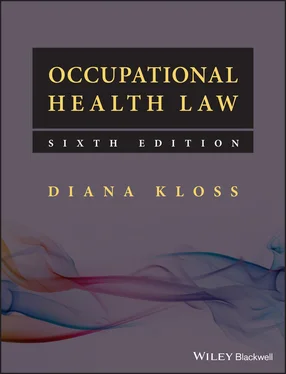The OH professional must also have the employer’s interest in mind, because a medical report which is carelessly written in the job applicant’s favour, resulting in the employer taking on an unreliable employee, might give rise to an action by the employer. The health professional owes a duty of care to the employer pre‐employment. For negligence to be established, it would be necessary to show not just that the professional’s assessment of the worker in question was at fault but that there had been a failure to do what a reasonable professional would have done. An example would be a report of a pre‐employment medical examination which stated that an employee with obvious symptoms of a serious heart condition was in the best of health.
Doctors in particular should be warned that it is not merely the content of their writing which needs attention. James Prendergast, an asthmatic, was prescribed Amoxil by his doctor. The writing on the prescription was so illegible that the pharmacist dispensed Daonil. The judge held that both the pharmacist and the doctor were negligent. The doctor had a duty to write clearly and the pharmacist should have checked with him because the dosage prescribed was unusually high for Daonil. The GP was 25 per cent and the pharmacist 75 per cent responsible ( Prendergast v. Sam and Dee (1988)).
In 2014, as a result of the findings of the inquiry chaired by Robert Francis QC into failures of care at Mid‐Staffordshire Hospital, legislation was passed to regulate health care and social care providers: Health and Social Care Act 2008 (Regulated Activities) Regulations 2014. These regulations do not apply to providers of occupational health services. Regulation 20 imposes a legal duty of candour on providers of care, that is a duty to inform patients or their relatives when something has gone wrong and to express sorrow and regret. The regulations are enforced by the Care Quality Commission which has power to bring a criminal prosecution for a breach. Although Francis recommended that health care professionals should also be subject to a legal duty to notify their employer of a failure of care, it was decided that the effect of imposing criminal sanctions would have the opposite effect, that is to make it less likely that an individual would report errors and failings to their manager. However, if mistakes are to be corrected it is important that management is made aware of them and for that reason the GMC and the Nursing and Midwifery Council (NMC) made a joint statement to all their members of their ethical obligations: Openness and honesty when things go wrong: the professional duty of candour (2015).
Every health care professional must be open and honest with patients when something that goes wrong with their treatment or care causes, or has the potential to cause, harm or distress. They must:
tell the patient (or where appropriate the patient’s advocate, carer or family) when something has gone wrong;
apologise to the patient (or where appropriate the patient’s advocate, carer or family);
offer an appropriate remedy or support to put matters right (if possible); and
explain fully to the patient (or where appropriate the patient’s advocate, carer or family) the short and long term effects of what has happened.
They must be open and honest with their colleagues, employers and relevant organisations and take part in reviews and investigations when requested. They must support and encourage each other to be open and honest and not stop someone from raising concerns.
2.6 Duties under the Equality Act 2010
The great majority of complaints of unlawful discrimination taken to employment tribunals name the employer as the respondent, but the OH professional may also be potentially liable. Section 109 of the Equality Act 2010 states that employers are liable for anything done by their employees in the course of employment and their agents with the authority of the principal, whether or not done with their knowledge or approval, unless they took all reasonable steps to prevent the discriminatory act. Section 110 provides that, where an employer is liable for the action of an employee or agent, the employee or agent is also liable; the employee or agent can be held liable even if the employer is not because they have the reasonable steps defence. One example where both employer and employees were liable was Michalak v. Mid Yorkshire Hospitals NHS Trust (2008). Three senior managers, as well as the NHS Trust, were held jointly and severally liable to pay £4.5 million compensation to a consultant physician who had suffered sex and race discrimination at their hands. If an organisation’s OH health professional knowingly directly discriminates against disabled applicants for employment, for example by automatically excluding as unfit anyone with a history of mental illness, the OH professional will be liable. One problem here is that codes of ethics and the common law prevent the OH professional from disclosing clinical details without consent, so that if consent cannot be obtained the decision on whether or not to recommend the disabled person for employment may, in practice, have to be made by the OH professional, rather than the manager. This was the situation in London Borough of Hammersmith and Fulham v. Farnsworth (2000) where an applicant for a job as a residential social worker, who had a history of serious depression, was rejected by the employer on the advice of the occupational physician who reported that she was likely to have higher than average sickness absence, without considering possible adjustments. Both the local authority and the physician were sued. The physician was held liable, as participating in the decision‐making process, but the judgment against her was reversed on appeal on a technicality. There is a fuller discussion of this case in Chapter 8, which points out that the OH professional’s role is to advise employers, not to make decisions, and that doubt has been cast on the reasoning in the Farnsworth case in subsequent precedents.
Equality and Human Rights Commission Employment Code of Practice (2011)
10.42 An employer can avoid discriminating against applicants to whom they have offered jobs subject to satisfactory health checks by ensuring that any health enquiries are relevant to the job in question and that reasonable adjustments are made for disabled applicants. It is particularly important that occupational health practitioners who are employees or agents of the employer understand the duty to make reasonable adjustments. If a disabled person is refused a job because of a negative assessment from an occupational health practitioner during which reasonable adjustments were not adequately considered, this could amount to unlawful discrimination if the refusal was because of the disability.
10.43 It is good practice for employers and occupational health practitioners to focus on any reasonable adjustments needed even if there is doubt about whether the person falls within the Act’s definition of a disabled person.
Section 111 of the Act states that a person must not instruct, cause or induce another person to do in relation to a third person anything which contravenes the relevant provisions of the Act. For example, a senior partner who suggests to HR that the recruitment of a receptionist with an obvious physical disability would present a bad image of the firm to clients and reflect badly on the recruiter’s judgement. Section 112 of the Act provides that a person who knowingly helps another to break the law is liable, unless it is reasonable to rely on a statement by the other that his or her action does not contravene the Act. An example given in the Equality and Human Rights Commission Code, paragraph 10.56, is of a line manager who failed to make reasonable adjustments for a machine operator with multiple sclerosis because he asked the company director whether adjustments were needed and was told that they were unnecessary because the employee was not in a wheelchair. The employer would be liable, but not the line manager. OH professionals should not normally give unequivocal advice to a manager that someone is unsuitable for employment. Instead, they should give information sufficient to allow the manager to make a decision. Another example in the Code is of a manager who would like a job to go to a female candidate and asks a clerical worker to look at the confidential files to let him know the sex of the applicants. The clerical worker who complies would be liable for sex discrimination unless, for example, they reasonably believed the manager’s assurance that his motive was to achieve a balance of the sexes in the department and that this was not a breach of the Act. An OH professional who gave a manager access to confidential medical records about a disabled person without consent, leading to the rejection of that person because of a disability, might also be liable under this section. It is submitted that it would be difficult to argue that it was reasonable for an OH professional to believe the manager’s assurance that consent was unnecessary. A professional should know better.
Читать дальше












